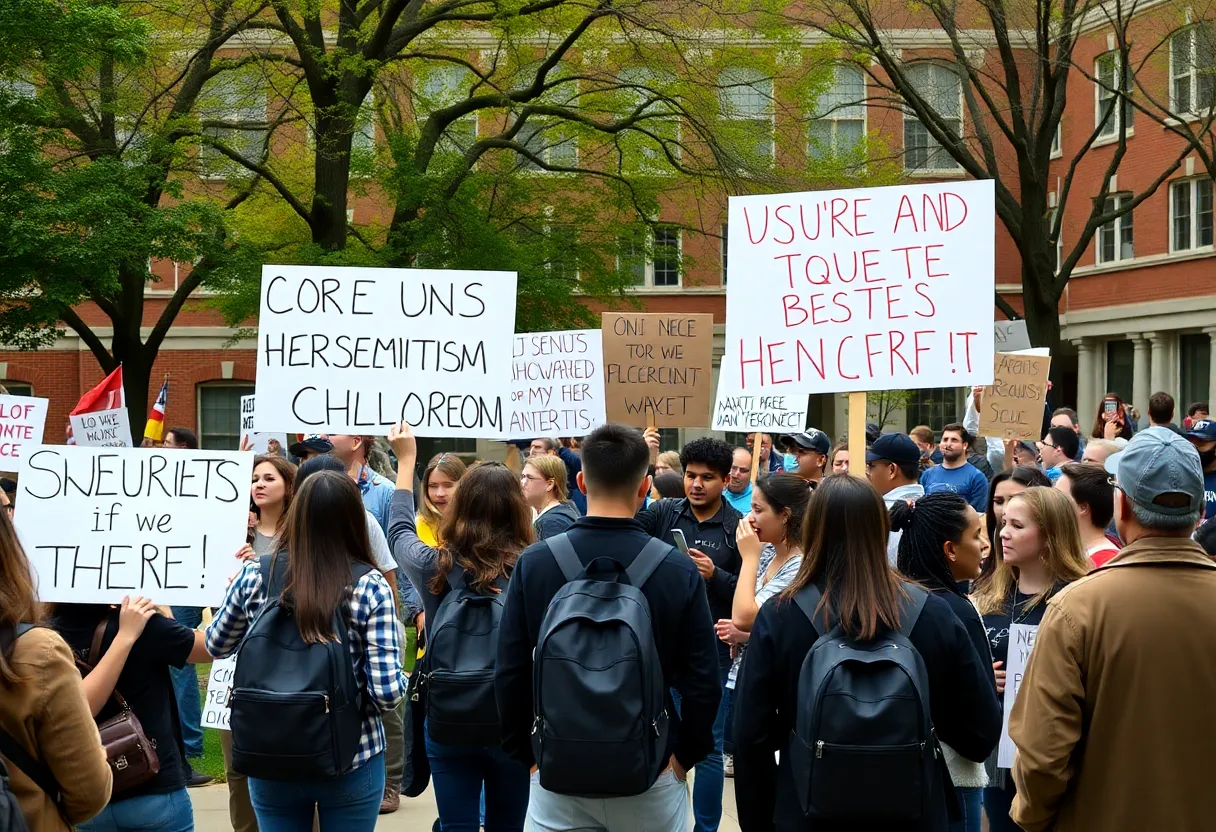News Summary
Columbia University has decided to integrate the International Holocaust Remembrance Alliance’s definition of antisemitism into its anti-discrimination policies. This comes in light of federal scrutiny regarding the university’s handling of antisemitism linked to campus protests. The adoption of this definition is seen as a necessary step to unlock $400 million in federal funding. Critics argue it may hinder free speech on Israel. The university aims to reform its policies while ensuring a dispute resolution process that addresses external pressures without compromising academic discourse.
New York City – Columbia University has agreed to incorporate the International Holocaust Remembrance Alliance’s (IHRA) definition of antisemitism into its anti-discrimination policies. This decision comes amid mounting federal pressure stemming from allegations that the university has inadequately addressed issues of antisemitism linked to protests on campus. The move is seen as essential for unlocking approximately $400 million in federal funding, which has been withheld due to these controversies.
The acting president of Columbia, Claire Shipman, emphasized that integrating the IHRA definition into the university’s framework signifies a strengthened commitment to combat antisemitism. This measure is part of a wider strategy to reform Columbia’s policies regarding campus protests and security, influenced by the demands of the government and the concerns of pro-Israel advocacy groups.
Critics of the IHRA definition assert that it may blur the lines between genuine antisemitism and legitimate criticism of the Israeli government, potentially stifling free speech related to Israel’s policies. Detractors fear that this definition could restrict meaningful academic discourse and disproportionately affect discussions that criticize anti-Israel sentiments. The university’s previous president, Minouche Shafik, resigned last year amid controversies about how Columbia handled protests and the accusations of antisemitism on campus.
Columbia’s commitment to adopting the IHRA definition also includes provisions for establishing a robust dispute resolution process. The university plans to involve independent monitors and arbitrators to oversee any conflicts, ensuring that decision-making remains in-house rather than ceding authority to the federal government. This approach is seen as an attempt to balance the needs of students and faculty while addressing external pressures regarding campus climate and safety.
Federal scrutiny intensified following the re-escalation of violence in Gaza in late 2023, and Columbia faced significant backlash from political leaders and advocacy groups over its perceived inaction on antisemitism. In March 2025, the university pledged to undertake substantial reforms in response to demands from the federal government, which included potential restructuring of its Middle Eastern studies programs.
Shipman stated that responding to these pressures would empower the university to acknowledge its past shortcomings and implement enduring change. The university faced criticism for exerting excessive discipline against students involved in protests, leading to suspensions and expulsions that drew public outcry for infringing on student rights. Columbia is currently engaged in negotiations regarding more than $200 million in compensation claims stemming from alleged civil rights violations by Jewish students, further complicating the situation surrounding federal funding and campus stability.
The rise in campus protests, particularly in response to the Israel-Hamas conflict, has heightened concerns related to student safety and incidents of antisemitism. In response to these growing tensions, Columbia has announced significant changes to its disciplinary policies, which now shift decision-making authority from the university senate to the provost’s office. This change is designed to streamline and enhance the university’s response to protests and related issues of safety and discrimination.
Overall, Columbia’s adoption of the IHRA definition represents a significant step in addressing the complexities of campus discourse surrounding antisemitism, free speech, and the intersection of these issues with broader political debates. The university is working to forge a path forward that promotes an inclusive environment while also meeting the stringent demands of federal oversight.
Deeper Dive: News & Info About This Topic
HERE Resources
Columbia University Reaches Settlement with Trump Administration
U.S. Colleges Settle with Trump Administration Over Funding
Federal Funding Restored for Columbia and Brown Universities
Brown University Reaches $50 Million Agreement with Trump Administration
Brown University Aligns with Trump’s Definitions of Gender
EEOC Finds Providence School District Violated Civil Rights Act
House Judiciary Committee Subpoenas Ivy League Universities
House Judiciary Committee Investigates Ivy League Price-Fixing
Johns Hopkins and UMD Sue DOD Over Research Funding Cuts
Columbia Grad and Pro-Palestinian Advocate Released
Additional Resources
- The Guardian
- AP News
- The New York Times
- The Times of Israel
- CBS News
- Wikipedia: Antisemitism
- Google Search: Columbia University antisemitism
- Google Scholar: Columbia University antisemitism
- Encyclopedia Britannica: Antisemitism
- Google News: Columbia University antisemitism
Author: STAFF HERE PROVIDENCE WRITER
The PROVIDENCE STAFF WRITER represents the experienced team at HEREProvidence.com, your go-to source for actionable local news and information in Providence, Providence County, and beyond. Specializing in "news you can use," we cover essential topics like product reviews for personal and business needs, local business directories, politics, real estate trends, neighborhood insights, and state news affecting the area—with deep expertise drawn from years of dedicated reporting and strong community input, including local press releases and business updates. We deliver top reporting on high-value events such as WaterFire, Rhode Island International Film Festival, and Rhode Island Comic Con. Our coverage extends to key organizations like the Greater Providence Chamber of Commerce and Providence Warwick Convention & Visitors Bureau, plus leading businesses in finance and manufacturing that power the local economy such as Citizens Financial Group and Textron. As part of the broader HERE network, we provide comprehensive, credible insights into Rhode Island's dynamic landscape.





